新概念第一册重点句型
新概念英语第一册重点句型总结
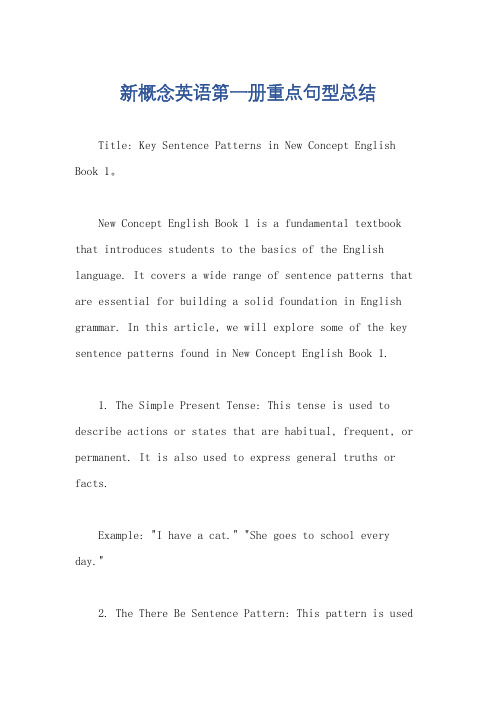
新概念英语第一册重点句型总结Title: Key Sentence Patterns in New Concept English Book 1。
New Concept English Book 1 is a fundamental textbook that introduces students to the basics of the English language. It covers a wide range of sentence patterns that are essential for building a solid foundation in English grammar. In this article, we will explore some of the key sentence patterns found in New Concept English Book 1.1. The Simple Present Tense: This tense is used to describe actions or states that are habitual, frequent, or permanent. It is also used to express general truths or facts.Example: "I have a cat." "She goes to school every day."2. The There Be Sentence Pattern: This pattern is usedto express the existence of something or someone in a particular place.Example: "There is a book on the table." "There are two cats in the garden."3. The Simple Past Tense: This tense is used to describe actions or events that have already happened in the past.Example: "I went to the park yesterday." "She bought a new dress last week."4. The Simple Future Tense: This tense is used to express actions or events that will happen in the future.Example: "I will go to the doctor tomorrow." "They will meet at the station at 10 a.m."5. The Present Continuous Tense: This tense is used to describe actions that are happening now or are in progress.Example: "I am studying now." "She is cooking dinner."6. The Basic Question Formation: Questions in English are formed by inverting the subject and verb. This pattern is used for yes/no questions and wh-questions.Example: "Are you a student?" "What is your name?"7. Imperative Sentences: These sentences are used to give commands or make requests. They are formed by using the base form of the verb.Example: "Close the door, please." "Don't forget to bring your book."8. The Basic Affirmative and Negative Sentences: Affirmative sentences express a positive statement, while negative sentences express a denial or opposition.Example: "I like coffee." (Affirmative) "I don't like coffee." (Negative)。
新概念第一册重点及重要句型121
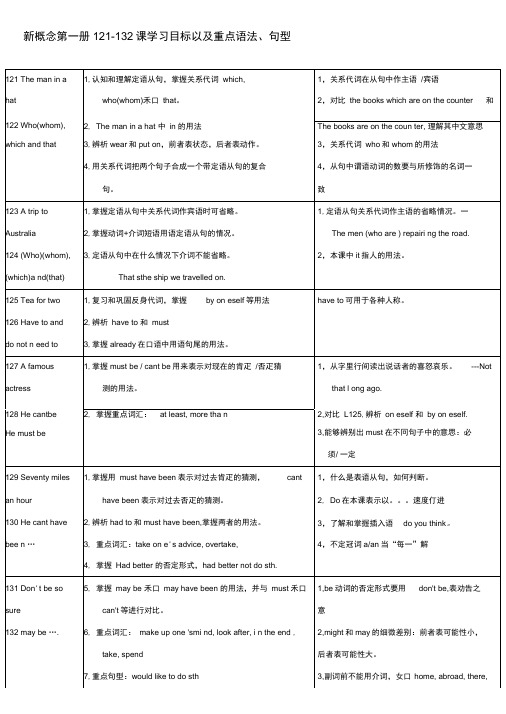
新概念第一册121-132课学习目标以及重点语法、句型who ,①(先行词)人+ who/that + 动词(作主语)The man who has white hair is .②(先行词)人 +whose +名词+动词(作定语)I have a friend whose father is a teacher.③(先行词)人 + who/whom/that + 及物动词/不及物动词 +介词(做宾语)The man we met is my uncle.④(先行词)物 + which/that + 动词(作主语) Lesson 121 & 122 The man in a hat 戴帽子的男士重点句型:在作业本上抄写重点句型,并翻译成汉语: 1. Who served you, sir .2. The lady who is standing behind the counter.3. Is this the man that you served, Caroline4.1 recognize him now.5. She is the woman who I served yesterday. 重要语法一一定语从句定语从句像形容词一样起修饰作用 ,但位于所修饰的名词之后。
定语从句由关系代词引导,紧跟在它所修饰的成分后面。
关系代词 whom 与that 修饰人,which 与that 修饰东西。
关系代词指代从句的主语或宾语,同时又充当连接词,把从句和主句连接起来1、关系代词: who, whom, whose, which, thatwhich 是指人以外的生命或没有生命的东西.:This is the bird which always sings at night. ⑤(先行词)物 +which/that + 主语 + 及物动词(作宾语) .:This is the letter I received yesterday.2、定语从句中的省略① 当关系代词代表主语并且从句中的谓语动词是(现在)进行时时态时,关系代词及助动词 be 均可省略② 如果关系代词在从句中作动词或介词的宾语,关系代词往往可以省略。
新概念第一册重点及重要句型1-12
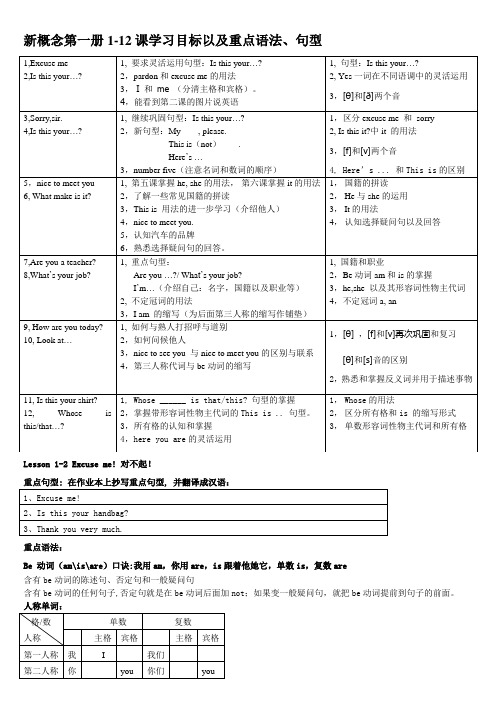
新概念第一册1-12课学习目标以及重点语法、句型Lesson 1-2 Excuse me! 对不起!重点句型: 在作业本上抄写重点句型, 并翻译成汉语:重点语法:Be 动词(am\is\are)口诀:我用am,你用are,is跟着他她它,单数is,复数are含有be动词的陈述句、否定句和一般疑问句含有be动词的任何句子,否定句就是在be动词后面加not;如果变一般疑问句,就把be动词提前到句子的前面。
人称单词:重点句型:重要语法1.祈使句:祈使句:主语通常不直接表示出来,其谓语动词用原型,也叫无主句。
表示命令、请求、建议、叮嘱等。
祈使句真正的主语是你,但省略了。
My umbrella and my coat please. 省略了动词和间接宾语的祈使句。
Keep off the grass! 请勿践踏草地!Help yourself! 请自己动手!某些祈使动词可以后跟and和另一个祈使动词,而不是后跟带to的动词不定式结构。
Come and see this goldfish.Go and buy yourself a new pair of shoes. 去给自己买双新鞋吧。
Wait and see. 等着瞧吧。
2.倒装句:here is 是简单的倒装句,be 动词放在here 的后面,这个句式就可以成为简单的倒装句式。
My ticket is here. 我的票在这。
Here is my ticket. / Here's my ticket.3.状态句之一:某物是某物在英语句子中,有一种句子表述的是静态的内容,只说明状态,没有动作:1).This is my handbag 这是我的手提包2).Is this your umbrella? 这是你的雨伞吗?3).He is my friend .他是我的朋友.Lesson 5 & 6 Nice to meet you. 很高心见到你。
新概念一L1-L30重点句型总结
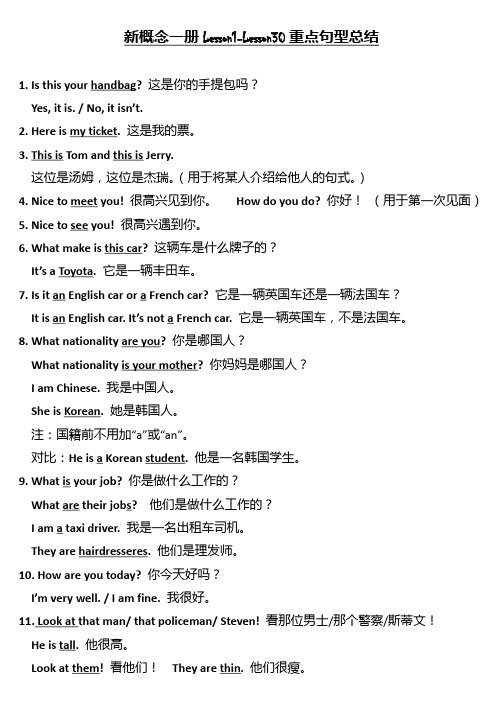
新概念一册Lesson1-Lesson30重点句型总结1. Is this your handbag? 这是你的手提包吗?Yes, it is. / No, it isn’t.2. Here is my ticket. 这是我的票。
3. This is Tom and this is Jerry.这位是汤姆,这位是杰瑞。
(用于将某人介绍给他人的句式。
)4. Nice to meet you! 很高兴见到你。
How do you do? 你好!(用于第一次见面)5. Nice to see you! 很高兴遇到你。
6. What make is this car? 这辆车是什么牌子的?It’s a Toyota. 它是一辆丰田车。
7. Is it an English car or a French car? 它是一辆英国车还是一辆法国车?It is an English car. It’s not a French car. 它是一辆英国车,不是法国车。
8. What nationality are you? 你是哪国人?What nationality is your mother? 你妈妈是哪国人?I am Chinese. 我是中国人。
She is Korean. 她是韩国人。
注:国籍前不用加“a”或“an”。
对比:He is a Korean student. 他是一名韩国学生。
9. What is your job? 你是做什么工作的?What are their jobs? 他们是做什么工作的?I am a taxi driver. 我是一名出租车司机。
They are hairdresseres. 他们是理发师。
10. How are you today? 你今天好吗?I’m very well. / I am fine. 我很好。
11. Look at that man/ that policeman/ Steven! 看那位男士/那个警察/斯蒂文!He is tall. 他很高。
新概念第一册每课知识点整理

新概念第一册每课知识点整理Lesson 1 - Excuse me!一、重点单词。
1. excuse.- 作动词,意为“原谅;宽恕”,例如:Excuse me.(打扰一下。
)- 作名词,意为“借口;理由”,如:Don't make excuses.(不要找借口。
)2. me.- 人称代词宾格,“我”,在句中作宾语,如:Give it to me.(把它给我。
)二、重点句型。
1. Excuse me!- 用于引起别人注意、请求让路、打断别人说话等场合,是比较礼貌的用法。
三、语法点。
简单的日常交际用语的使用。
Lesson 2 - Is this your…?一、重点单词。
1. pen.- 名词,“钢笔”。
2. pencil.- 名词,“铅笔”。
3. book.- 名词,“书”。
4. watch.- 名词,“手表”;也可作动词,“观看”,如:watch TV(看电视)。
二、重点句型。
1. Is this your pen?- 这是一般疑问句,其结构为“be动词(is/are等)+主语+其他”,回答可以是“Yes, it is.”或者“No, it isn't.”三、语法点。
1. 一般疑问句的构成与回答。
2. 指示代词this的用法,用来指代离说话者较近的人或物。
Lesson 3 - Sorry, sir.一、重点单词。
1. umbrella.- 名词,“雨伞”。
2. please.- 副词,用于请求别人做某事时表示礼貌,如:Please open the window.(请打开窗户。
)二、重点句型。
1. Is this your umbrella?- 同Lesson 2中的一般疑问句结构。
2. Sorry, sir.- “sorry”表示歉意,“sir”是对男性的尊称。
三、语法点。
1. 继续巩固一般疑问句。
2. 尊称“sir”的用法。
Lesson 4 - Is this your…?一、重点单词。
新概念英语一册语法1-72总结
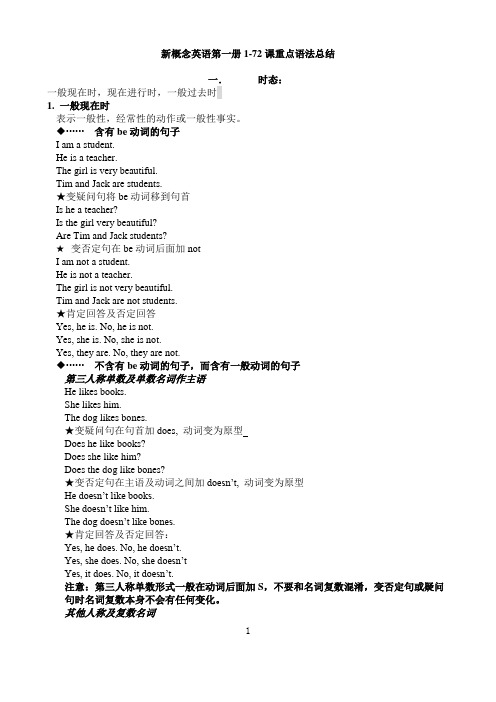
新概念英语第一册1-72课重点语法总结一.时态:一般现在时,现在进行时,一般过去时1. 一般现在时表示一般性,经常性的动作或一般性事实。
◆∙∙∙∙∙∙ 含有be动词的句子I am a student.He is a teacher.The girl is very beautiful.Tim and Jack are students.★变疑问句将be动词移到句首Is he a teacher?Is the girl very beautiful?Are Tim and Jack students?★变否定句在be动词后面加notI am not a student.He is not a teacher.The girl is not very beautiful.Tim and Jack are not students.★肯定回答及否定回答Yes, he is. No, he is not.Yes, she is. No, she is not.Yes, they are. No, they are not.◆∙∙∙∙∙∙ 不含有be动词的句子,而含有一般动词的句子第三人称单数及单数名词作主语He likes books.She likes him.The dog likes bones.★变疑问句在句首加does, 动词变为原型Does he like books?Does she like him?Does the dog like bones?★变否定句在主语及动词之间加doesn’t, 动词变为原型He doesn’t like books.She doesn’t like him.Th e dog doesn’t like bones.★肯定回答及否定回答:Yes, he does. No, he doesn’t.Yes, she does. No, she doesn’tYes, it does. No, it doesn’t.注意:第三人称单数形式一般在动词后面加S,不要和名词复数混淆,变否定句或疑问句时名词复数本身不会有任何变化。
新概念英语第一册单词+短语+重点句型
新概念英语第一册单词+短语+重点句型New Concept English is a popular English language learning series that has been widely used by English learners all over the world. In the first book of the series, students are introduced to basic vocabulary, useful phrases, and key sentence structures. In this document, we will explore some of the important words, phrases, and sentence patterns from New Concept English Book 1.Vocabulary:1. Apple2. Bag3. Cat4. Dog5. ElephantPhrases:1. How are you?2. What's your name?3. Please sit down.4. How do you do?5. What's the time?Key Sentence Patterns:1. Subject + Verb: The cat sleeps.2. Subject + Verb + Object: The dog eats meat.3. Subject + Verb + Adverb: She reads quickly.4. Subject + Verb + Adjective: He is tall.5. Subject + Verb + Object + Adverb: They sing songs loudly.As students progress through New Concept English Book 1, they will become more familiar with these words, phrases, and sentence patterns. By practicing them regularly, students can improve their English language skills and become more confident in using English in everyday conversations.In conclusion, New Concept English Book 1 is a great resource for English learners to build a solid foundation in the language. By mastering the basic vocabulary, useful phrases, and key sentence patterns introduced in this book, students can develop their English proficiency and communicate effectively in English-speaking environments.。
新概念英语第一册Lesson125_130重点句型及语法
新概念英语第一册Lesson125~130重点句型及语法【导语】为了方便同学们的学习,小编为您精心整理了“新概念英语第一册Lesson125~130重点句型及语法”,希望有了这些内容的帮助,可以为大家学习新概念英语提供帮助!如果您想要了解更多新概念英语的相关内容,就请关注小编吧!新概念英语第一册Lesson125~126重点句型及语法一、重要句型或语法情态动词本课侧重的是情态动词must和need的用法,同时对比了have to的用法。
其中,需要注意的是must与have to的区别以及must的否定表达。
如:1)Do you have to water it now? I'm afraid I must.问句采用have to,强调的是客观上是否不得不,而回答时采用must,强调是自己主观认为必须。
2)That means you don't need to water the garden.句中的don't need to用作must的否定表达。
二、课文主要语言点Can't you come in and have tea now, Peter?Not yet. I must water the garden first.1)Can't you... 反问句,往往用来提出建议或质疑。
2)not yet,还没有、还没好3)water the garden,给花园浇水。
water在此用作动词,表示浇水的意思,如waterthe flowers,浇花。
Do you have to water it now? I'm afraid I must. 注意have to与must的区别:have to强调是出于客观原因“不得不”做某事,而must则偏重的是主观上认为“必须”。
另外,have to不是情态动词,就是一般的动词短语,之所以会放到情态动词里一起讲解,只是因为它可以表“必须”。
新概念英语第一册中最重要的三个句型
新概念英语第一册中最重要的三个句型英语句子是表达观点的基础。
我们可以用不同的句型来谈论生活,谈论家庭,谈论爱情;表达喜怒哀乐。
有些同学认为要背下这些句子才能表达观点和感情。
这也正是大家认为英语很难学或英语靠背诵的原因。
其实所有这些丰富的句子是由三个最基本的英语句型变化而来的。
新概念一册注重基本的语音,口语句型和基本的语法知识,所以学好第一册是非常关键的。
而事实上,新概念一册的很多课文都是在对这三种基本句型的学习和练习。
三个基本句型如下:一、主语+系动词+表语例如新概念一册Lesson 13 A new dress一课中的That s a nice dress 、It s green 、My hat s new, too 、It s the same colour 、That is a lovely hat! 等都是在练习这个基本句型。
在这一句型中:1. 主语是句子的主体。
名词和代词可以做主语。
2. 系动词用于连接主语和表语。
使用最多的是Be 动词(am, is, are)。
3. 表语表示主语的身份、状态以及所处的位置。
名词,形容词,介词短语可以作表语。
在这一课中:That s a nice dress. 是使用的代词做主语,名词作表语。
It s very smart. 是使用的代词做主语,形容词作表语。
My hat s new. 是使用的名词做主语,形容词作表语。
第三十一课的she s in the garden. 就是使用的代词做主语,介词短语作表语。
二、There be 句型There be句型的结构一般为:There + be + 名词+ 时间/地点。
表示某个地方/时间有某物/人。
例如新概念一册Lesson 25 Mrs. Smith s kitchen一课中的There is a refrigerator in the kitchen. 、There is an electric cooker in the kitchen. 、There is a bottle on the table. 、There is a cup on the table. 等使用的都是这样的句型。
新概念英语第一册重点词汇和语法(完整版)
新概念英语第一册语法总结1-4 一般疑问句:1-2 一般疑问句肯定回答 3-4 一般疑问句否定回答5-14 特殊疑问句15-16 一般疑问句复数17-18 特殊疑问句复数19-20 名词单数21-24 不定代词。
双宾结构25-28 there be 句型,介词用法29-30 祈使句31-36 现在进行时,there be 句型分析,介词复习37-40 一般将来时, be going to41-42不可数名词,量词的用法43-46 情态动词 can47-50 一般现在时55-56 频度副词57-58 时间59-60复习不可数名词,量词的用法61-64 must 用法65-66 时间表达法:直接,间接,反身代词,情态动词复习67-72 一般过去时主系表结构73-75 一般过去时主谓宾结构77-78 情态动词的否定疑问句,时间介词79-80 need must 情态动词81-82 have –had83-84 现在完成时进行时,将来时对比85-86 have been to / have gone to87-88否定疑问句89-90 may 情态动词91-94 will 一般将来时过去/现在/将来95-96 had better97-98 伴随状语,名词性物主代词99-100 宾语从句101-102 直接引语,间接引语,103-104 too, very, enough105-106动词不定式107-112 形容词的比较级,最高级113-114 否定,肯定倒装115-116 不定代词117-118 时间状语从句,过去进行时119-120 过去完成时121-124 定于从句125-126 must / have to127- 132 情态动词表推测133-136直接引语,间接引语,137-138 条件状语从句139-140宾语从句141-144 被动语态Lesson 1 Excuse me1. Words1) excuse (1)重音(2)与sorry 的区别(3)Excuse 用的不同场景a. 请别人让路b. 引起别人的注意c. 打断别人的谈话d. 可以当n. 借口 eg. No excuse. 别找借口,没有借口。
- 1、下载文档前请自行甄别文档内容的完整性,平台不提供额外的编辑、内容补充、找答案等附加服务。
- 2、"仅部分预览"的文档,不可在线预览部分如存在完整性等问题,可反馈申请退款(可完整预览的文档不适用该条件!)。
- 3、如文档侵犯您的权益,请联系客服反馈,我们会尽快为您处理(人工客服工作时间:9:00-18:30)。
1. Excuse me! 打扰了,对不起(1)2.Nice to meet you! 很高兴见到你(5)3.What nationality are you? I ' m Chines你是哪国人我是中国人(7)4.What' s your job? I ' am an egine你是做什么工作的我是工程师(7)5.How are you? I ' m well/ finef尔好么我很好(9)6.Nice to see you! 见到你很高兴(9)7.Is this shirt Tim ?这件衬衫是蒂姆的吗(11)8.Perhaps it is.也许是(9)9.What color is your new dress? 尔的新连衣裙是什么颜色的(13)10.It ' s the same colo r样的颜色(13)11.Are your friends tourists too? 尔们的朋友也是来旅游的吗(15)e and meet our employees.来见见我们的雇员(17)13.Who is this young man? 这个年轻人是谁(17)14.What' s the matter with …怎么啦(19)15.Are you all right now? 尔们现在好些了么(19)16.There is an ice cream man. 有个卖冰淇凌的(19)17.Give me a book, please. 请拿本书给我(21 )18.Which book? 那一本(21 )19.Which glasses? 那几只(23 )20.Whose shirt is this?= Whose is this shirt? 这是谁的衬衫(11)21.No, not that one. The red one. 不,不是那个,是红色的。
(21 )22.It is on the left/right. 它在左侧/右侧(25)23.There is a table in the middle of the room. 房间中央有张桌子(25)24.What must I do? 我应该做什么(30)25.Put these clothes in the wardrobe. 把这些衣服放进衣柜里去(29)26.Make the bed. 整理床铺(29)27.Where is she? 她在哪儿(31 )28.What is she doing? 她在干嘛(31 )29.She' s sitting in the garden她正坐在院子里。
(31)30.What about the dog? 那么狗呢(31 )31.It ' s running after a do它正在追一只猫。
(31)32.This is a photograph of our village. 这是一张我们村庄的照片。
(35)33.It ' s between two hi它在两座小山之间。
(33)35)34.Some children are coming out of the building. 一些孩子正从楼里出来。
35.Some of them are going into the park. 他们中有几个正走进公园。
(35)36.What are you going to do? 尔打算去干什么(37)37.What color are you going to paint it? 尔打算把它漆成什么颜色(37)38.It ' s for my daughte它是给我女儿的。
(37)39.Pink ' s my favorite color粉红色是我最喜欢的颜色。
(37)40.What are you going to do with it? 尔打算怎么处理它(39)41.Don' t drop it! 别摔了!(39)42.Can you make the tea? 尔会沏茶么(43)43.Hurry up! 快点!(43)44.Can you come here a minute please? 请尔来一下好吗(45)45.Do you want a cup? 尔想要一杯吗(47)46.Do you want any sugar? 尔要些糖吗(47)47.Do you like biscuits? 尔喜欢饼干吗(47)48.My husband doesn ' t like chicken我丈夫也不喜欢鸡肉。
(49)49.To tell you the truth, I don ' t like chi(说老n e ther.我也不喜欢鸡。
50.Where do you come from?= Where are you from? 你从哪儿来( 51)51.What ' s the climate like in your country? 你们国家的气候怎么样( 51)52.What' s the weather like in spring?春天的天气怎么样(51)53.Which season do you like best? 你最喜欢哪个季节( 53)54.The sun rises early and sets late. 太阳升得早而落得晚。
( 53)55.It ' s our favourite subject of conversatio它是我们最喜欢谈论的话题。
(53)56.Their father takes them to school every day. 他们的父亲每天都送他们去上学。
(55)57.He arrives home late. 他到家很晚。
( 55)58.What' s the time?=What time is it? 几点了( 58)59.Is all that? 就这些吗( 59)60.Do you want the large size or the small size? 你想要大号的还是小号的( 59)61.What else do you want? 你还要什么吗( 59)62.What' s the matter with him?他怎么啦(61)63.He feels/looks ill. 他感觉/看起来病了。
( 61)64.We must call the doctor. 你必须请医生。
( 61 )65.He must stay in bed for a week. 他必须卧床一周。
( 61 )66.You mustn ' t get up ye你还不应该起床。
(63)67.He must remain in bed for another two days. 他必须再卧床两天。
( 63)68.You must keep the room warm. 你必须保持房间温暖。
( 63)69.Was he absent from school last week? 他上星期上学了么( 67)70.We are going to spend three days in the country. 我们打算到乡下去三天。
( 67)71.There were hundreds of people there. 许许多多的人到在哪儿。
( 69)72.You can see us in the crowd. 你可以在人群中看到我们。
( 69)73.What' s he like?他怎么样(71)74.She can ' t speak to you noW他现在不能和你说话。
(71)75.She does not know London very well. 她对伦敦不熟悉。
( 73)76.She lost her way. 她迷路了。
( 73)77.Can you tell me the way to 你能告诉我到…怎么走么(73)73) 78.Then he put his hand into his pocket and took out a phrasebook. 然后他把手伸进衣袋里掏出了一本手册。
79.Can you get a pair for me? 您能为我找一双吗( 75)80.I ' m afraid that I can 我恐怕不行。
(73)81.They were in fashion last year. 它们去年时兴。
(75)82.Do you have an appointment? 您约好了吗( 77)83.Is it urgent? 很急吗( 77)84.Can' t you wait till this afternoon ? 你就不能等到今天下午吗( 77)85.I ' m making a shopping list我正在写购物单。
(79)86.We need a lot of things this week. 这星期我们需要很多东西。
(79)87.We haven ' t got much tea or coffee我们的茶叶和咖啡不多了。
( 79)88.We haven ' t got any meat at all. 我们一点肉都没有了。
(79)89.He is having a bath. 他正在洗澡。
( 81 )90.I ' m nearly ready我马上就好。
(81)91.I' ve already had lunch我已经吃过午饭了。
(83)92.Excuse the mess! 屋里很乱,请原谅! ( 83)93.I stayed at home. 我呆在家里。
( 83)94.Have you just been to the cinema? 你刚去过电影院吗( 85)95.What' s on上映什么电影?(85)96.Have you ever been there? 你曾经去过那儿吗( 85)97.It rained all the time. 一直在下雨。
( 85)98.Just like London! 就像伦敦。
( 85)99.When did you bring it to us? 您是什么时候送来的( 87)100.Have your mechanics finished yet? 你们的机械师修好了吗( 87)101.Let ' s go into the garage and have a look at i让我们到车库去看一看吧。
